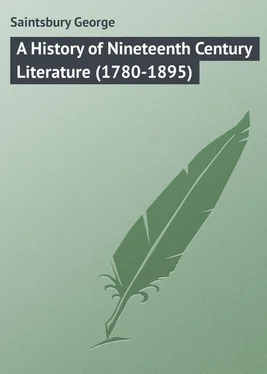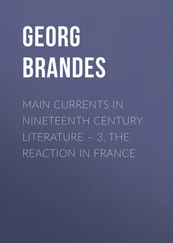George Saintsbury - A History of Nineteenth Century Literature (1780-1895)
Здесь есть возможность читать онлайн «George Saintsbury - A History of Nineteenth Century Literature (1780-1895)» — ознакомительный отрывок электронной книги совершенно бесплатно, а после прочтения отрывка купить полную версию. В некоторых случаях можно слушать аудио, скачать через торрент в формате fb2 и присутствует краткое содержание. ISBN: , Жанр: foreign_prose, на английском языке. Описание произведения, (предисловие) а так же отзывы посетителей доступны на портале библиотеки ЛибКат.
- Название:A History of Nineteenth Century Literature (1780-1895)
- Автор:
- Жанр:
- Год:неизвестен
- ISBN:http://www.gutenberg.org/ebooks/31698
- Рейтинг книги:5 / 5. Голосов: 1
-
Избранное:Добавить в избранное
- Отзывы:
-
Ваша оценка:
- 100
- 1
- 2
- 3
- 4
- 5
A History of Nineteenth Century Literature (1780-1895): краткое содержание, описание и аннотация
Предлагаем к чтению аннотацию, описание, краткое содержание или предисловие (зависит от того, что написал сам автор книги «A History of Nineteenth Century Literature (1780-1895)»). Если вы не нашли необходимую информацию о книге — напишите в комментариях, мы постараемся отыскать её.
A History of Nineteenth Century Literature (1780-1895) — читать онлайн ознакомительный отрывок
Ниже представлен текст книги, разбитый по страницам. Система сохранения места последней прочитанной страницы, позволяет с удобством читать онлайн бесплатно книгу «A History of Nineteenth Century Literature (1780-1895)», без необходимости каждый раз заново искать на чём Вы остановились. Поставьте закладку, и сможете в любой момент перейти на страницу, на которой закончили чтение.
Интервал:
Закладка:
It was in 1783 – a date which, in its close approximation to the first appearances of Crabbe and Cowper, makes the literary student think of another group of first appearances in the early "eighties" of the sixteenth century foreshadowing the outburst of Elizabethan literature – that Blake's first book appeared. His Poetical Sketches , now one of the rarest volumes of English poetry, was printed by subscription among a literary coterie who met at the house of Mr. and Mrs. Mathew; but the whole edition was given to the author. He had avowedly taken little or no trouble to correct it, and the text is nearly as corrupt as that of the Supplices ; nor does it seem that he took any trouble to make it "go off," nor that it did go off in any appreciable manner. Yet if many ears had then been open to true poetical music, some of them could not have mistaken sounds the like of which had not, as has been said, been heard since the deaths of Herrick and Vaughan. The merit of the contents is unequal to a degree not to be accounted for by the mere neglect to prepare carefully for press, and the influence of Ossian is, as throughout Blake's work, much more prominent for evil than for good. But the chaotic play of Edward the Third is not mere Elizabethan imitation; and at least half a dozen of the songs and lyrical pieces are of the most exquisite quality – snatches of Shakespeare or Fletcher as Shakespeare or Fletcher might have written them in Blake's time. The finest of all no doubt is the magnificent "Mad Song." But others – "How sweet I roamed from Field to Field" (the most eighteenth century in manner, but showing how even that manner could be strengthened and sweetened); "My Silks and Fine Array," beautiful, but more like an Elizabethan imitation than most; "Memory Hither Come," a piece of ineffable melody – these are things which at once showed Blake to be free of the very first company of poets, to be a poet who for real essence of poetry excelled everything the century had yet seen, and everything, with the solitary exception of the Lyrical Ballads at its extreme end, that it was to see.
Unfortunately it was not by any means as a poet that Blake regarded himself. He knew that he was an artist, and he thought that he was a prophet; and for the rest of his life, deviating only now and then into engraving as a mere breadwinner, he devoted himself to the joint cultivation of these two gifts, inventing for the purpose a method or vehicle of publication excellently suited to his genius, but in other respects hardly convenient. This method was to execute text and illustrations at once on copper-plates, which were then treated in slightly different fashions. Impressions worked off from these by hand-press were coloured by hand, Blake and his wife executing the entire process. In this fashion were produced the lovely little gems of literature and design called Songs of Innocence (1789) and Songs of Experience (1794); in this way for the most part, but with some modifications, the vast and formidable mass of the so-called "Prophetic" Books. With the artistic qualities of Blake we are not here concerned, but it is permissible to remark that they resemble his literary qualities with a closeness which at once explains and is explained by their strangely combined method of production. That Blake was not entirely sane has never been doubted except by a few fanatics of mysticism, who seem to think that the denial of complete sanity implies a complete denial of genius. And though he was never, in the common phrase, "incapable of managing" such very modest affairs as were his, the defect appears most in the obstinate fashion in which he refused to perfect and co-ordinate his work. He could, when he chose and would give himself the trouble, draw quite exquisitely; and he always drew with marvellous vigour and imagination. But he would often permit himself faults of drawing quite inexplicable and not very tolerable. So, too, though he had the finest gift of literary expression, he chose often to babble and still oftener to rant at large. Even the Songs of Innocence and Experience – despite their double charm to the eye and the ear, and the presence of such things as the famous "Tiger," as the two "Introductions" (two of Blake's best things), and as "The Little Girl Lost" – show a certain poetical declension from the highest heights of the Poetical Sketches . The poet is no longer a poet pure and simple; he has got purposes and messages, and these partly strangle and partly render turbid the clear and spontaneous jets of poetry which refresh us in the "Mad Song" and the "Memory." And after the Songs Blake did not care to put forth anything bearing the ordinary form of poetry. We possess indeed other poetical work of his, recovered in scraps and fragments from MSS., and some of it is beautiful. But it is as a rule more chaotic than the Sketches themselves; it is sometimes defaced (being indeed mere private jottings never intended for print) by personality and coarseness; and it is constantly puddled with the jargon of Blake's mystical philosophy, which, borrowing some of its method from Swedenborg and much of its imagery and nomenclature from Ossian , spreads itself unhampered by any form whatever over the Prophetic Books. The literary merit of these in parts is often very high, and their theosophy (for that is the best single word for it) is not seldom majestic. But despite the attempts of some disciples to evolve a regular system from them, students of philosophy as well as of literature are never likely to be at much odds as to their real character. "Ravings" they are not, and they are very often the reverse of "nonsense." But they are the work of a man who in the first place was very slightly acquainted with the literature and antecedents of his subject, who in the second was distinctly non compos on the critical, though admirably gifted on the creative side of his brain, and who in the third had the ill luck to fall under the fullest sway of the Ossianic influence. To any one who loves and admires Blake – and the present writer deliberately ranks him as the greatest and most delectable poet of the eighteenth century proper in England, reserving Burns as specially Scotch – it must always be tempting to say more of him than can be allowed on such a scale as the present; but the scale must be observed.
There is all the more reason for the observance that Blake exercised on the literary history of his time no influence, and occupied in it no position. He always had a few faithful friends and patrons who kept him from starvation by their commissions, admired him, believed in him, and did him such good turns as his intensely independent and rather irritable disposition would allow. But the public had little opportunity of seeing his pictures, and less of reading his books; and though the admiration of Lamb led to some appreciation from Southey and others, he was practically an unread man. This cannot be said of Robert Burns, who, born as was said a year or two after Blake, made his first literary venture three years after him, in 1786. Most people know that the publication, now famous and costly, called "the Kilmarnock Edition," was originally issued in the main hope of paying the poet's passage to Jamaica after an unfortunate youth of struggle, and latterly of dissipation. Nay, even after the appearance of the Poems and their welcome he still proposed to go abroad. He was summoned back to Edinburgh to reprint them, to make a considerable profit by them, and to be lionised without stint by the society of the Scottish capital. He then settled down, marrying Jean Armour, at Ellisland in Dumfriesshire, on a small farm and a post in the Excise, which, when his farming failed and he moved to Dumfries itself, became his only regular means of support. He might have increased this considerably by literature; but as it was he actually gave away, or disposed of for trifling equivalents, most of the exquisite songs which he wrote in his later years. These years were unhappy. He hailed the French Revolution with a perfectly innocent, because obviously ignorant, Jacobinism which, putting all other considerations aside, was clearly improper in a salaried official of the Crown, and thereby got into disgrace with the authorities, and also with society in and about Dumfries. His habits of living, though their recklessness has been vastly exaggerated, were not careful, and helped to injure both his reputation and his health. Before long he broke down completely, and died on the first of July 1796, his poetical powers being to the very last in fullest perfection.
Читать дальшеИнтервал:
Закладка:
Похожие книги на «A History of Nineteenth Century Literature (1780-1895)»
Представляем Вашему вниманию похожие книги на «A History of Nineteenth Century Literature (1780-1895)» списком для выбора. Мы отобрали схожую по названию и смыслу литературу в надежде предоставить читателям больше вариантов отыскать новые, интересные, ещё непрочитанные произведения.
Обсуждение, отзывы о книге «A History of Nineteenth Century Literature (1780-1895)» и просто собственные мнения читателей. Оставьте ваши комментарии, напишите, что Вы думаете о произведении, его смысле или главных героях. Укажите что конкретно понравилось, а что нет, и почему Вы так считаете.












